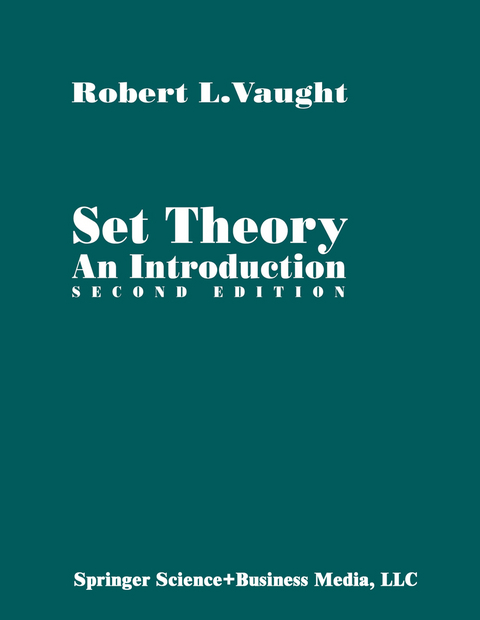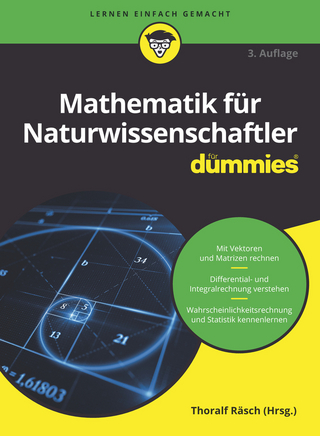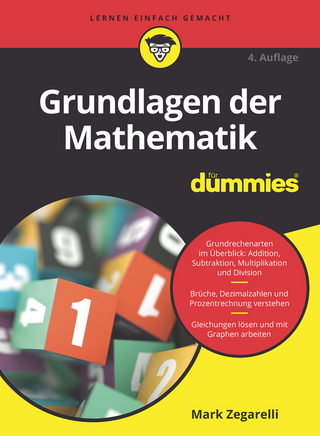
Set Theory: An Introduction
Seiten
2001
|
2nd ed. 1995. 1st softcover printing 2001
Birkhauser Boston Inc (Verlag)
978-0-8176-4256-3 (ISBN)
Birkhauser Boston Inc (Verlag)
978-0-8176-4256-3 (ISBN)
By its nature, set theory does not depend on any previous mathematical knowl edge. Von Neumann's 'inner model' proof is easy to grasp and yet it prepares one for the famous and more difficult work of GOdel and Cohen, which are the main topics of any book or course in set theory at the next level.
By its nature, set theory does not depend on any previous mathematical knowl edge. Hence, an individual wanting to read this book can best find out if he is ready to do so by trying to read the first ten or twenty pages of Chapter 1. As a textbook, the book can serve for a course at the junior or senior level. If a course covers only some of the chapters, the author hopes that the student will read the rest himself in the next year or two. Set theory has always been a sub ject which people find pleasant to study at least partly by themselves. Chapters 1-7, or perhaps 1-8, present the core of the subject. (Chapter 8 is a short, easy discussion of the axiom of regularity). Even a hurried course should try to cover most of this core (of which more is said below). Chapter 9 presents the logic needed for a fully axiomatic set th~ory and especially for independence or consistency results. Chapter 10 gives von Neumann's proof of the relative consistency of the regularity axiom and three similar related results. Von Neumann's 'inner model' proof is easy to grasp and yet it prepares one for the famous and more difficult work of GOdel and Cohen, which are the main topics of any book or course in set theory at the next level.
By its nature, set theory does not depend on any previous mathematical knowl edge. Hence, an individual wanting to read this book can best find out if he is ready to do so by trying to read the first ten or twenty pages of Chapter 1. As a textbook, the book can serve for a course at the junior or senior level. If a course covers only some of the chapters, the author hopes that the student will read the rest himself in the next year or two. Set theory has always been a sub ject which people find pleasant to study at least partly by themselves. Chapters 1-7, or perhaps 1-8, present the core of the subject. (Chapter 8 is a short, easy discussion of the axiom of regularity). Even a hurried course should try to cover most of this core (of which more is said below). Chapter 9 presents the logic needed for a fully axiomatic set th~ory and especially for independence or consistency results. Chapter 10 gives von Neumann's proof of the relative consistency of the regularity axiom and three similar related results. Von Neumann's 'inner model' proof is easy to grasp and yet it prepares one for the famous and more difficult work of GOdel and Cohen, which are the main topics of any book or course in set theory at the next level.
1. Sets and Relations and Operations among them.- 2. Cardinal Numbers and Finite Sets.- 3. The Number Systems.- 4. More on Cardinal Numbers.- 5. Orders and Order Types.- 6. Axiomatic Set Theory.- 7. Well-orderings, Cardinals, and Ordinals.- 8. The Axiom of Regularity.- 9. Logic and Formalized Theories.- 10. Independence Proofs.- 11. More on Cardinals and Ordinals.- Proofs of some results in Chapter 9.- Other References.- Recommendations for more advanced reading.- Solutions to Selected Problems.
| Erscheint lt. Verlag | 28.8.2001 |
|---|---|
| Zusatzinfo | X, 167 p. |
| Verlagsort | Secaucus |
| Sprache | englisch |
| Maße | 216 x 279 mm |
| Themenwelt | Mathematik / Informatik ► Mathematik ► Allgemeines / Lexika |
| Mathematik / Informatik ► Mathematik ► Logik / Mengenlehre | |
| ISBN-10 | 0-8176-4256-0 / 0817642560 |
| ISBN-13 | 978-0-8176-4256-3 / 9780817642563 |
| Zustand | Neuware |
| Haben Sie eine Frage zum Produkt? |
Mehr entdecken
aus dem Bereich
aus dem Bereich


